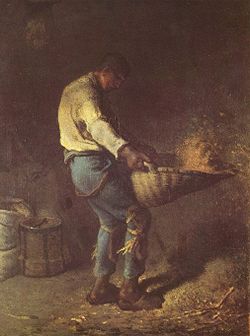- Matthew 3:12
-
 Jean-François Millet's depiction of winnowing
Jean-François Millet's depiction of winnowing
Matthew 3:12 is the twelfth verse of the third chapter of the Gospel of Matthew in the New Testament. The verse occurs in the section relating the preachings of John the Baptist. In this he uses the imagery of harvesting wheat to describe God's judgement.
In the King James Version of the Bible the text reads:
- Whose fan is in his hand, and
- he will thoroughly purge his floor,
- and gather his wheat into the
- garner; but he will burn up
- the chaff with unquenchable fire.
The World English Bible translates the passage as:
- His winnowing fork is in his
- hand, and he will thoroughly
- cleanse his threshing floor. He
- will gather his wheat into the
- barn, but the chaff he will
- burn up with unquenchable fire."
For a collection of other versions see BibRef Matthew 3:12
This verse describes wind winnowing, the period's standard process for separating the wheat from the chaff. The word translated as winnowing fork in the WEB is a tool similar to a pitchfork that would be used to lift harvested wheat up into the air into the wind. The wind would then blow away the lighter chaff allowing the edible grains to fall to the threshing floor, a large flat surface. The unneeded chaff would then be burned. As with the axe already placed against the tree in the preceding verse, the winnowing fork is already in hand, emphasizing the nearness of judgement.[1]
Winnowing forks, generally made of wood, were common at the time, and several dating from this period have been found. Modern scholars mostly agree that the term "winnowing fork" is the most accurate but older versions have fan, shovel, broom, and other translations. In the Eastern Orthodox church the word was most often interpreted as broom and a common icon shows Christ holding a broom.
In this verse John the Baptist is still assumed to be addressing the Pharisees and Sadducees. The eschatological imagery is quite clear. The wheat represents those who are truly repentant, the chaff those like the Pharisees and Sadducees who are not. The messiah will clear the world, and those that are worthy would be brought into his "barn" while those that were unworthy will burn in unquenchable fire. France notes that unquenchable is in no way a synonym for eternal and that no doctrine of eternal damnation for the wicked should be read into this passage.[2]
References
Gospel of Matthew Preceded by:
Matthew 3:11Chapter 3 Followed by:
Matthew 3:13Categories:- Gospel of Matthew verses
- John the Baptist
Wikimedia Foundation. 2010.
